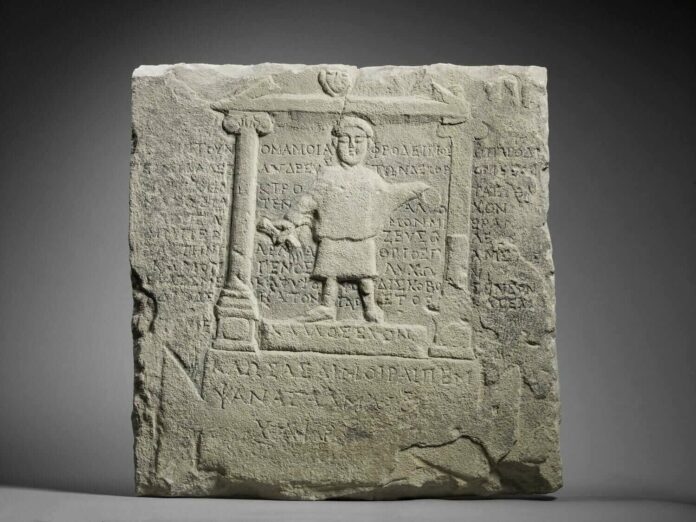Throughout the ages, epitaphs have served as poignant reflections of the lives and deaths of individuals. They can be tender tributes to lost loved ones, evocative of their virtues and accomplishments, or, in some rare cases, they can be scandalously revealing. Such is the case of the tombstone of Aphrodisios of Alexandria Troas, an artifact now housed in the Louvre, which stands out as perhaps the most embarrassing tombstone ever discovered.
A Tale of Betrayal and Tragedy
The inscription on the tombstone of Aphrodisios is a dramatic and deeply personal account that reads more like a soap opera than a solemn farewell. This epitaph, recently translated into English by Greek historian Angelos Chaniotis and brought to public attention by Roko Rumora on social media, reveals a story of betrayal, passion, and murder.
The tombstone reads:
“Passer-by, Aphrodisios is my name; I’m a citizen of Alexandria Troas and a leader of the chorus. I die a most pathetic death because of my wife, the dirty adulteress (whom Zeus will destroy). Her secret lover Lychon—a member of my own family!—slaughtered me, still in my youth. He threw me from the heights like a discus. I was twenty years old, so full of beauty, when the Moirai spun my fate and sent me as a delight to Hades.”
This inscription is unique in its raw and unfiltered portrayal of personal misfortune. It leaves little to the imagination and provides a vivid picture of the dramatic end met by the young Aphrodisios.

The Context of Alexandria Troas
Alexandria Troas, an ancient city located on the Aegean coast of Anatolia, was a bustling hub of trade and culture during the Hellenistic and Roman periods. As a city with significant Greek influence, it was home to many public and cultural activities, including choruses, which Aphrodisios led. This role suggests he was a person of some standing within the community, making the scandalous nature of his death all the more shocking.
Scandal in the Ancient World
While ancient Greek and Roman epitaphs often celebrated the virtues of the deceased, this tombstone instead reveals a scandalous tale of infidelity and familial betrayal. Aphrodisios’ wife, condemned as a “dirty adulteress,” and her lover, Lychon, who is shockingly revealed to be a family member, are both blamed for his untimely demise. The dramatic description of Lychon throwing Aphrodisios from a height “like a discus” adds a visceral and almost cinematic quality to the account.

The epitaph’s invocation of Zeus’ wrath against the adulteress and the reference to the Moirai (the Fates) emphasize the dramatic and tragic elements of his story, reflecting the ancient Greek belief in the capricious and often cruel nature of fate.
An Embarrassing Legacy
What makes this tombstone particularly embarrassing is the candid and public nature of the accusation. Unlike typical epitaphs that aim to preserve the dignity and honor of the deceased, this inscription exposes a deeply personal and shameful episode for all to see. It’s a stark reminder that the ancients were not so different from us in their capacity for public displays of personal grievances.
The tombstone of Aphrodisios of Alexandria Troas stands as a testament to the fact that not all epitaphs are created equal. Some serve to immortalize love and loss, while others, like this one, lay bare the most intimate and embarrassing moments of a person’s life. In the case of Aphrodisios, his tombstone ensures that his tragic story of betrayal and murder will be remembered for generations to come, a lasting, albeit mortifying, legacy.
Video
